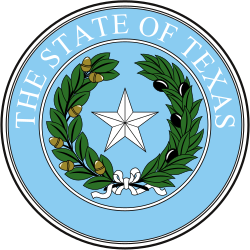1941 United States Senate special election in Texas
| |||||||||||||||||||||||||||||||||||||
| |||||||||||||||||||||||||||||||||||||
O'Daniel: 20–30% 30–40% 40–50% 50–60% Johnson: 30–40% 40–50% 50–60% 60–70% 70–80% >90% | |||||||||||||||||||||||||||||||||||||
| |||||||||||||||||||||||||||||||||||||
| Elections in Texas |
|---|
 |
|
|
The 1941 United States Senate special election in Texas was held on June 28, 1941, to complete the unexpired term of Senator Morris Sheppard, who died in office on April 9. Interim Senator Andrew Jackson Houston did not run for re-election and died only two days before the election. The race was won by Governor Pappy O'Daniel with a plurality of the vote; no majority was required.
O'Daniel very narrowly defeated U.S. Representative Lyndon B. Johnson, who won the seat after O'Daniel's retirement in 1948.
Background
[edit]In April 1941, incumbent Senator Morris Sheppard died in office. Governor Pappy O'Daniel appointed Andrew Jackson Houston to fill the seat until a successor could be duly elected, with the election scheduled for June 28. The winner finished Sheppard's term ending in 1943.
Houston did not run to complete the term, only serving as a placeholder for Governor O'Daniel. He died in office only two days before the election.
Candidates
[edit]Major candidates
[edit]- Martin Dies Jr., U.S. Representative from Lufkin and Chair of the House Un-American Activities Committee
- Lyndon B. Johnson, U.S. Representative from Gillespie County
- Gerald Mann, Attorney General of Texas[2]
- Pappy O'Daniel, Governor of Texas
Minor candidates
[edit]None of these candidates received more than 0.30% of the popular vote.
- Joseph C. Bean
- John R. Brinkley
- Homer Brooks
- E. A. Calvin
- Arlon Barton "Cyclone" Davis
- Politte Elvins
- Guy B. Fisher
- Enoch Fletcher
- W. E. Gilliland
- A. E. Harding
- Basil Muse Hatfield
- Robert Grammer Head
- O.F. Heath Sr.
- Bubba Hicks
- W. R. Jones
- W. W. "Cap" King
- Starl G. Newsome Jr.
- Floyd E. Ryan
- Walter A. Schulz
- Charles L. Somerville
- Joe Thompson
- Edwin Waller III
- W. C. Welch
- John C. Williams
All of these candidates were Democrats except Evans (Republican), Fletcher (Republican), Jones (Independent), and Brooks (Communist).
Allegations of fraud
[edit]In The Path to Power, Johnson biographer Robert Caro argues that the election results were manipulated in O'Daniel's favor by lobbyists from Texas' alcohol industry. O'Daniel was a staunch prohibitionist, and as Governor, he had proposed a bill preventing the sale of alcohol within ten miles of a military base; Caro notes how business interests feared the passing of this bill, as preparations for World War II had brought thousands of young soldiers into the region. To prevent the passing of this bill, lobbyists sought to elect O'Daniel to the Senate to place the "wet" lieutenant governor Coke Stevenson in the governorship, and hence rigged ballots in East Texas, swinging the election in O'Daniel's favor.[3]
Results
[edit]| Party | Candidate | Votes | % | |
|---|---|---|---|---|
| Democratic | Pappy O'Daniel | 175,590 | 30.49% | |
| Democratic | Lyndon B. Johnson | 174,279 | 30.26% | |
| Democratic | Gerald Mann | 140,807 | 24.45% | |
| Democratic | Martin Dies Jr. | 80,653 | 14.01% | |
| Various | Minor candidates | 4,548 | 0.79% | |
| Total votes | 575,877 | 100.00% | ||
See also
[edit]Notes
[edit]References
[edit]- ^ Texas State Historical Association (1943). "Texas Almanac, 1943-1944". The Portal to Texas History. The Dallas Morning News. pp. 259–260. Retrieved June 20, 2022.
- ^ "Let Conscience Be Your Guide!". Friends of Gerald C. Mann. Corpus Christi Caller-Times. June 25, 1941. Retrieved February 18, 2022.
- ^ Caro, Robert A. (1982). The Path to Power: The Years of Lyndon Johnson I. Westminster: Knopf Doubleday Publishing Group. pp. 734–740. ISBN 9780679729457.
- ^ "TX US Senate – Special Election". OurCampaigns.com. Retrieved December 1, 2020.






